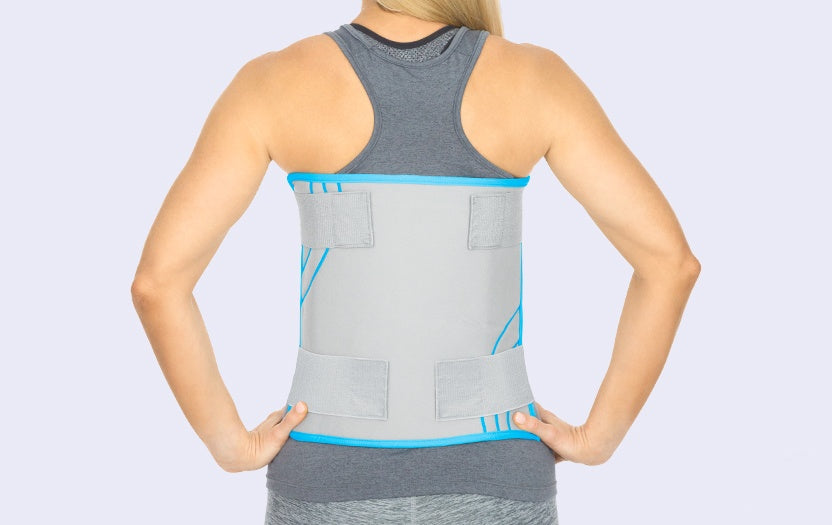Your Cart is Empty
Injury

Dealing with neck or back pain and finding out you have a herniated disc can be overwhelming. Luckily when it comes to herniated disc treatment, the right knowledge and tools will help you immediately start healing. Depending on your unique symptoms and lifestyle, there are great options to consider for treatment. Non-surgical options are a great place to start with the possibility of more invasive techniques as necessary.
The biggest concern with disc herniation is nerve damage so proper evaluation is important. If you notice changes in bowel or bladder control, significant weakness, or loss of sensation in the arms or legs, talk to a physician for immediate medical advice.
When an injury is new, rest may be required to allow the body to sufficiently initiate it’s inflammatory process for healing. Rest may initially minimize the risk of further injury, especially if movement is exacerbating symptoms and causing severe pain. However, bed rest has been found to be the least helpful option for any type of back pain since it can lead to poor circulation, pain avoidance, loss of muscle strength, and stiffness.
Getting moving is one of the most cost effective options out there. You just simply have to find stretches and exercises that work best for you. Plus, evidence shows that it works! Back pain and disc injuries commonly lead to poor movement patterns and imbalanced muscle use. The spine muscles, particularly the core, can become weak or simply hard to properly control when pain is present.
No matter where you start, make sure to find exercises that don’t exacerbate your symptoms (especially muscle spasms and guarding) and can be done consistently. Chances are you will be able to slowly progress as you feel better and realize what your body is capable of!
Heat and cold can do wonders for a newly injured back to promote both circulation and relaxation in adjunct with exercises. With a new injury, cold therapy is typically the most effective option for controlling any excessive inflammation or muscle tension. Whereas, heat can be a great option throughout the healing process to promote relaxation and minimize muscle imbalances. Heat is particularly useful for treating muscle spasms that just won't give up. By figuring out your preferences and paying attention to what works best, you can decide what options to do. Typically, both options will feel great and you can alternate between the two throughout your day for optimal recovery. Learn more about how to properly treat lower back pain caused by a herniated disc with hot and cold therapy below.
Massage provides the same benefits as hot and cold therapy, such as circulation and relaxation. Meaning any tight, sore muscles and joints will feel less stiff and painful. Massage can decrease your overall stress levels and promote a sense of well-being to ultimately improve your outcomes as you heal your back. These benefits can be achieved with a massage therapist or even at home with the right tools.
Physical therapists are experts at teaching you how to properly move and restore balance to your body. They will provide you invaluable information related to proper lifting techniques and other normal activities. Talk to a physical therapist to get a physical exam and start on a personalized exercise program. They can also provide recommendations related to all of the above discussed treatment options. All this personalization and education can help you feel confident in treating your own back and help you safely return to all your normal activities.
Chiropractic care specifically focuses on addressing areas of immobility or stiffness in the back. Many people swear by the benefits of a good chiropractor to loosen up a specific area in the back. With a herniated disc, make sure to proceed with caution since adjustments have a small risk of causing further damage.
Medication can be helpful but comes with risks. Please make sure to thoroughly discuss your options with a medical professional before taking any type of medication, prescribed or over the counter.
Anti-inflammatory medications, or nonsteroidal anti-inflammatory drugs (NSAIDs), are commonly taken to help with the pain relief and stiffness that comes with a herniated disc. Some of the most common pain medications are ibuprofen, aleve, and advil. This can be a great temporary option for breaking the inflammatory cycle and allowing you to establish a good treatment program without excessive pain. It should not be considered a long term treatment option since all pain relievers pose health risks to your health, such as kidney damage.
This is a more invasive option that can be used when your back pain is severe and not improving. It involves using a needle to inject medication directly into the spine. These steroid injections are most commonly used when nerve symptoms are present, such as sharp shooting arm or leg pain. Cortisone can potentially lead to immediate improvement in pain and inflammation. However, it doesn’t address the underlying factors causing your pain and poses a risk for further tissue damage.
As with all medication options, muscle relaxants are a great short term option to allow the initiation of proper recovery. They can allow you to properly rest by decreasing overall muscle tension, an important part of the healing process.
There are several options for surgical intervention with a herniated disc. The most common surgical procedure for herniated disc is a microdiscectomy. This means they simply remove the area of the disc that is protruding. Other spine surgery options include artificial disc replacement, spine fusion, and laminectomy (removal of specific areas of bone). These options all come with risk factors related to surgery such as symptom exacerbation, surgical pain, blood clots, or poor response to anesthesia.
Surgery should never be considered for treating a herniated disc when neck pain or low back pain is the only bothersome symptom. It should be considered only when there are severe neurological issues. Plus, the risk of further progression and other herniated discs significantly rises with surgery. Make sure to discuss all your possible options and medical history with your orthopaedic surgeon first to make the right decision for you. Non-invasive conservative treatment is always the better initial option when possible.
Recovery time significantly depends on the following lifestyle factors.
In general, a large majority of back injuries will resolve within 6 weeks with non-invasive treatment. Recovery can take significantly longer with more severe injuries. For example, most physical therapy patients will remain in treatment for 3-6 months. Recovery typically takes longer for the cervical spine than the lumbar spine. This is because the neck is inherently less stable and is considered much more important for daily function that the lumbar spine.
When surgery is involved, a minimum of 12 weeks recovery is needed for healing. However, people typically continue to make improvements as nerves heals for up to one year. Ultimately, recovery time can vary significantly depending on the amount of damage to both the spinal cord and nerve roots.
The spine is a complicated structure. With a herniated disc, it is most important to listen to your body and re-establish balance. If you feel overwhelmed, start by talking to a healthcare provider to get personalized recommendations that work for you
SHOP HERNIATED DISC PRODUCTS
![The Benefits of Flexibility [A.K.A. The Secret Sauce for Aging]](http://www.vivehealth.com/cdn/shop/articles/Smiling-retired-woman-listening-to-music-while-stretching-legs-outdoors._600x.jpg?v=1713090677)

